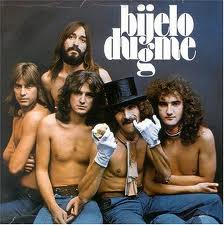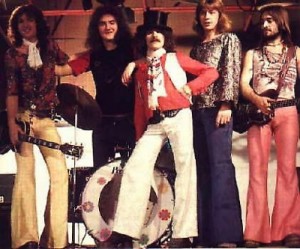Here in Rovinj, a picture perfect little town on Croatia’s Adriatic Coast, the third annual “Media Weekend Festival,” September 23-25, brought together over 2,500 media, PR, advertising and communications specialists from countries of the former Yugoslavia to hear from international experts on new trends in the media field, assess the regional media situation and provide a networking forum.
While most events were future-oriented, focusing on new tactics and strategy, using

Not Your Average White Band
social media to greatest effect, and showcasing cutting edge products and designs, several sessions provided a historical perspective on this region in transition for the mostly under 35 crowd in attendance.
Of particular interest was the screening of a recently released documentary, “Bijelo Dugme” by Serbian film director Igor Stoimenov, chronicling Yugoslavia’s most successful rock band, called Bijelo Dugme (White Button), whose sensational 15 year run paralleled the final decade and a half of Yugoslavia itself.
Back in the 1970’s and ‘80’s, while kids behind the Iron Curtain were secretly recording the Beatles and Rolling Stones from Western radio stations broadcasting on mostly jammed shortwave signals, Yugoslavia had a home grown rock group that brought its youth out en masse, filling concert halls and outdoor venues in unprecedented numbers.
As the 90 minute film documents through interviews with surviving band members, film directors and critics, and archival footage, in 1974, shortly after Tito’s government announced a constitution that gave greater powers to the constituent Yugoslav republics and autonomous provinces of Kosovo and Vojvodina within Serbia, five guys from Sarajevo burst on the music scene singing, “If I were a white button on your shirt…” to a driving beat and terrific guitar riffs. Lacking a name, they decided to call the band “White Button,” after the song.
They soared to the top of the charts and soon, kids all over the country, in cities, towns and villages, went crazy over their music, a synthesis of rock and folk, with shades of Led Zeppelin, that seemed to speak to everyone.
One hundred thousand showed up for an outdoor concert in Belgrade in the summer of 1977. Another performance in the city’s largest sports stadium in September, 1979, which this writer and her husband attended as young diplomats posted to the Yugoslav capital, felt like Woodstock, East European style.

Where's Tito?
At the height of their popularity, Bijelo Dugme played up their bad boy rock group reputation: drugs, sex, wild parties, all duly covered in the country’s tabloid press. But the government did not hesitate to make an example of the band when things went too far: as a warning to youth on drug use, the band’s drummer was incarcerated for three years in Yugoslavia’s harshest prisons for possession of a small amount of hashish. He later committed suicide. At another point, to atone for their decadent lifestyle, the band engaged in physical labor outdoors in the best tradition of communist youth brigades, all dutifully publicized by the media.
When in 1981, a year after Tito’s death, Kosovo Albanian students demonstrated and voiced calls for independence within Yugoslavia, Bijelo Dugme wrote and sang a song in Albanian in an effort, as they described it, to show support for the protestors’ desire to be recognized. (Band member and songwriter Goran Bregovic was quoted as saying, “After so many years living together with them, why not try to learn a few Albanian words?”)
But as separatist sentiment grew in the late 80’s, Bijelo Dugme’s audiences took to chanting nationalist slogans in unison as they waited for concerts to begin, something the band members found quite distressing.
By 1989, disillusioned by what was going on in the country and musically running out of steam, the band broke up. A year later, independence movements gained strength, beginning a new chapter in the region’s history. Bijelo Dugme defined an era, and died with it.
[Click here to listen to one of their best known songs, “Bitanga i Princeza” (The Tramp and the Princess).]
